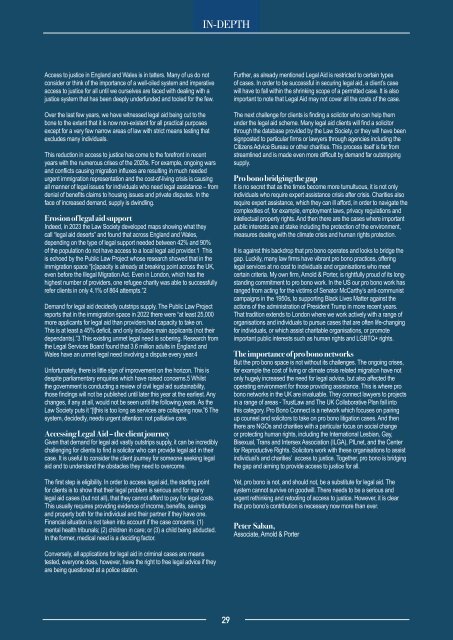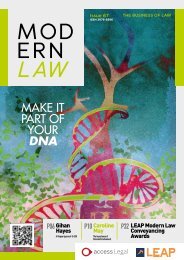Modern Law Magazine Issue 69
Create successful ePaper yourself
Turn your PDF publications into a flip-book with our unique Google optimized e-Paper software.
IN-DEPTH<br />
Access to justice in England and Wales is in tatters. Many of us do not<br />
consider or think of the importance of a well-oiled system and imperative<br />
access to justice for all until we ourselves are faced with dealing with a<br />
justice system that has been deeply underfunded and tooled for the few.<br />
Over the last few years, we have witnessed legal aid being cut to the<br />
bone to the extent that it is now non-existent for all practical purposes<br />
except for a very few narrow areas of law with strict means testing that<br />
excludes many individuals.<br />
This reduction in access to justice has come to the forefront in recent<br />
years with the numerous crises of the 2020s. For example, ongoing wars<br />
and conflicts causing migration influxes are resulting in much needed<br />
urgent immigration representation and the cost-of-living crisis is causing<br />
all manner of legal issues for individuals who need legal assistance – from<br />
denial of benefits claims to housing issues and private disputes. In the<br />
face of increased demand, supply is dwindling.<br />
Erosion of legal aid support<br />
Indeed, in 2023 the <strong>Law</strong> Society developed maps showing what they<br />
call “legal aid deserts” and found that across England and Wales,<br />
depending on the type of legal support needed between 42% and 90%<br />
of the population do not have access to a local legal aid provider.1 This<br />
is echoed by the Public <strong>Law</strong> Project whose research showed that in the<br />
immigration space “[c]apacity is already at breaking point across the UK,<br />
even before the Illegal Migration Act. Even in London, which has the<br />
highest number of providers, one refugee charity was able to successfully<br />
refer clients in only 4.1% of 864 attempts.”2<br />
Demand for legal aid decidedly outstrips supply. The Public <strong>Law</strong> Project<br />
reports that in the immigration space in 2022 there were “at least 25,000<br />
more applicants for legal aid than providers had capacity to take on.<br />
This is at least a 45% deficit, and only includes main applicants (not their<br />
dependants).”3 This existing unmet legal need is sobering. Research from<br />
the Legal Services Board found that 3.6 million adults in England and<br />
Wales have an unmet legal need involving a dispute every year.4<br />
Unfortunately, there is little sign of improvement on the horizon. This is<br />
despite parliamentary enquiries which have raised concerns.5 Whilst<br />
the government is conducting a review of civil legal aid sustainability,<br />
those findings will not be published until later this year at the earliest. Any<br />
changes, if any at all, would not be seen until the following years. As the<br />
<strong>Law</strong> Society puts it “[t]his is too long as services are collapsing now.”6 The<br />
system, decidedly, needs urgent attention: not palliative care.<br />
Accessing Legal Aid – the client journey<br />
Given that demand for legal aid vastly outstrips supply, it can be incredibly<br />
challenging for clients to find a solicitor who can provide legal aid in their<br />
case. It is useful to consider the client journey for someone seeking legal<br />
aid and to understand the obstacles they need to overcome.<br />
The first step is eligibility. In order to access legal aid, the starting point<br />
for clients is to show that their legal problem is serious and for many<br />
legal aid cases (but not all), that they cannot afford to pay for legal costs.<br />
This usually requires providing evidence of income, benefits, savings<br />
and property both for the individual and their partner if they have one.<br />
Financial situation is not taken into account if the case concerns: (1)<br />
mental health tribunals; (2) children in care; or (3) a child being abducted.<br />
In the former, medical need is a deciding factor.<br />
Further, as already mentioned Legal Aid is restricted to certain types<br />
of cases. In order to be successful in securing legal aid, a client’s case<br />
will have to fall within the shrinking scope of a permitted case. It is also<br />
important to note that Legal Aid may not cover all the costs of the case.<br />
The next challenge for clients is finding a solicitor who can help them<br />
under the legal aid scheme. Many legal aid clients will find a solicitor<br />
through the database provided by the <strong>Law</strong> Society, or they will have been<br />
signposted to particular firms or lawyers through agencies including the<br />
Citizens Advice Bureau or other charities. This process itself is far from<br />
streamlined and is made even more difficult by demand far outstripping<br />
supply.<br />
Pro bono bridging the gap<br />
It is no secret that as the times become more tumultuous, it is not only<br />
individuals who require expert assistance crisis after crisis. Charities also<br />
require expert assistance, which they can ill afford, in order to navigate the<br />
complexities of, for example, employment laws, privacy regulations and<br />
intellectual property rights. And then there are the cases where important<br />
public interests are at stake including the protection of the environment,<br />
measures dealing with the climate crisis and human rights protection.<br />
It is against this backdrop that pro bono operates and looks to bridge the<br />
gap. Luckily, many law firms have vibrant pro bono practices, offering<br />
legal services at no cost to individuals and organisations who meet<br />
certain criteria. My own firm, Arnold & Porter, is rightfully proud of its longstanding<br />
commitment to pro bono work. In the US our pro bono work has<br />
ranged from acting for the victims of Senator McCarthy’s anti-communist<br />
campaigns in the 1950s, to supporting Black Lives Matter against the<br />
actions of the administration of President Trump in more recent years.<br />
That tradition extends to London where we work actively with a range of<br />
organisations and individuals to pursue cases that are often life-changing<br />
for individuals, or which assist charitable organisations, or promote<br />
important public interests such as human rights and LGBTQ+ rights.<br />
The importance of pro bono networks<br />
But the pro bono space is not without its challenges. The ongoing crises,<br />
for example the cost of living or climate crisis related migration have not<br />
only hugely increased the need for legal advice, but also affected the<br />
operating environment for those providing assistance. This is where pro<br />
bono networks in the UK are invaluable. They connect lawyers to projects<br />
in a range of areas - Trust<strong>Law</strong> and The UK Collaborative Plan fall into<br />
this category. Pro Bono Connect is a network which focuses on pairing<br />
up counsel and solicitors to take on pro bono litigation cases. And then<br />
there are NGOs and charities with a particular focus on social change<br />
or protecting human rights, including the International Lesbian, Gay,<br />
Bisexual, Trans and Intersex Association (ILGA), PILnet, and the Center<br />
for Reproductive Rights. Solicitors work with these organisations to assist<br />
individual’s and charities’ access to justice. Together, pro bono is bridging<br />
the gap and aiming to provide access to justice for all.<br />
Yet, pro bono is not, and should not, be a substitute for legal aid. The<br />
system cannot survive on goodwill. There needs to be a serious and<br />
urgent rethinking and retooling of access to justice. However, it is clear<br />
that pro bono’s contribution is necessary now more than ever.<br />
Peter Saban,<br />
Associate, Arnold & Porter<br />
Conversely, all applications for legal aid in criminal cases are means<br />
tested, everyone does, however, have the right to free legal advice if they<br />
are being questioned at a police station.<br />
29
















